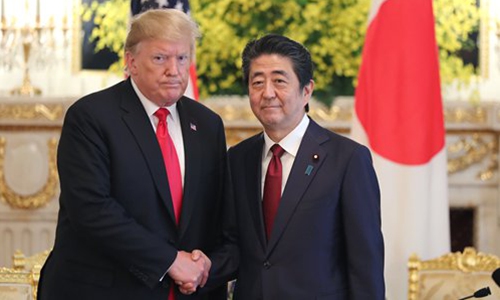HOME >> OPINION
After 60 years, how will Japan and US deal with cracks showing up in alliance?
By Chen Yang Source:Global Times Published: 2020/1/20 19:03:41

Photo: IC
Japan and the US on Sunday marked the 60th anniversary of signing a key security treaty.According to the Japan Times, Japanese Prime Minister Shinzo Abe and members of his cabinet attended a commemorative reception in Tokyo on Sunday. Speaking on the occasion, Abe said, "Today, more than ever, the Japan-US security treaty is a pillar that is indestructible, a pillar immovable, safeguarding peace in Asia, the Indo-Pacific, and in the world, while assuring prosperity therein."
US President Donald Trump on Saturday said in a statement, "As the security environment continues to evolve and new challenges arise, it is essential that our alliance [between Japan and the US] further strengthen and deepen... I am confident that in the months and years ahead, Japan's contribution to our mutual security will continue to grow."
Since Japan's surrender in 1945, Tokyo has signed two security treaties with the US. In 1951, then Japanese prime minister Shigeru Yoshida signed the Security Treaty, which contains provisions for disposition of US land, air and sea forces in and about Japan.
In 1952, Japan and the US signed an Administrative Agreement under Article III of the Security Treaty between the countries, which classifies the privilege and status of the US armed forces in Japan.
Because the treaty was perceived to be unfair, then Japanese society was not satisfied with the pact. Former Japanese prime minister Nobusuke Kishi in 1960 signed the Treaty of Mutual Cooperation and Security with the US, replacing the one signed in 1951. The provisions of the amended treaty were more equal compared with the one signed in 1951, clarifying the rights and obligations of US armed forces in Japan.
Article V has often been mentioned, which states "Each Party recognizes that an armed attack against either Party in the territories under the administration of Japan would be dangerous to its own peace and safety and declares that it would act to meet the common danger in accordance with its constitutional provisions and processes."
Both Trump and former US president Barack Obama affirmed that Article V of the US-Japan Treaty of Mutual Cooperation and Security covered the Diaoyu Islands, which escalated China-Japan tensions.
Actually, the Treaty of Mutual Cooperation and Security between the two countries can only achieve nominal equality. Japan's position in the US-Japanese alliance has often been seen as subordinate. The overall power disparity between the two countries and victor-vanquished relationship have failed to realize true equality. Under the alliance framework, many practices by the US governments have not taken Japan's feelings into account.
Being an ally of Washington for six decades, Tokyo has indeed harvested benefits. For example, under US protection, Japan could fully concentrate on its economic development and reduce spending on defense, rapidly becoming a global economic power
However, the negative impact of the alliance on Japan has also been apparent, which constraints the advances of the country's diplomacy. Due to alliance with the US, it has been hard for Japan's ties with Russia (or the Soviet Union) and North Korea to make significant improvements.
Furthermore, Japan harbors the ambition to mediate the Middle East countries. Yet Japan's close ties with the US have made it hard to win the faith of the relevant countries. It can partly explain why since the end of World War II, Japan has only been an economic power, rather than a political one.
There is no permanent alliance across the world, and the US-Japan alliance will eventually end. Under the alliance framework, Tokyo and Washington have rows on diverse issues.
The current US-Japan alliance is facing a new destabilizing factor - President Trump. Since the presidential election in 2016, Trump has repeatedly expressed his dissatisfaction with the US-Japan alliance and criticized the security treaty as being unfair.
It was Japan which complained that the alliance with US was not on equal terms, but it has been rare to see Trump's direct criticism.
No matter the comments are intended to strike a bargain in negotiations, or he means them, Trump's rhetoric would have profound influence on the alliance. It has prompted concern in Japanese society on whether this alliance will continue.
Rather than the alliance itself, the Japanese are worrying about their future. Japanese politicians have not portrayed a clear picture of how Japan will deal with Asia and the world without the US shield. This is what Japanese need to consider on the 60th anniversary of their alliance with the Americans.
The author is a media professional and an observer of Japan issues. opinion@globaltimes.com.cn
Posted in: ASIAN REVIEW